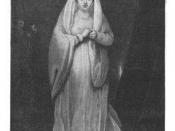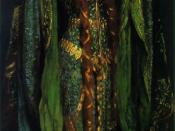How is evil explored in the Play Macbeth.
A dark night and a dark place are both symbolic of diablerie in the play Macbeth. Authors use these symbols to describe an evil character or setting. William Shakespeare employs the imagery of darkness in Act 4 and Act 1 of his play Macbeth to describe the agents of disorder and evil, the witches, Macbeth, and Scotland are all described as dark because they represent the evil.
The witches in the first scene of Act 4 and Act 1 are depicted as agents of evil because of the dark domain around them. The witches meet in a dark cave. The cave is an appropriate setting for the witches because caves tend to represent the under-world and hell, creating a feeling of evil. The witches appearance, "secret, black, and midnight hags" also indicate their evil nature. The witch's dark meeting place and dark appearance all emphasize their destructive nature.
Macbeth in Act 4 consulted with the witches, murdered Macduff's family, and continued to create evil in Scotland. Macbeth in Act 4 is described as an agent of disorder, "untitled tyrant bloody-sceptered". The language in Act 1 that described Macbeth has changed from "noble" and "kind" to the diction of Act 4 which describes Macbeth as "black Macbeth" and a "tyrant". The Castle that Macbeth lives in, Dunsanine is also indicative of darkness. Dunsanine is similar to the word dungeon a dark and dirty place symbolising hell and the evil that lives in hell.
In Act 4 Macbeth is a vision of utter evil, he murders and he consults witches and murders, because of this he is described using dark imagery. Scotland under the rule of Macbeth is described as, "shrouded in darkness", by Malcolm. Scotland in Act 4 has fallen off the "Chain of Being" and is now occupied with the forces of evil and disorder. Scotland in Act 4 is filled with "sighs, and groans, and shrieks that rent the air". Scotland is described by Ross as, "O Nation Miserable". All these descriptions of Scotland portray Scotland as a place where the agents of evil have shrouded the land.
The agents of evil and disorder were symbolized by darkness in Act 4. The witches were described as, "dark as midnight"; Macbeth was described as , "devilish and dark"; and Scotland was described as "dying". The imagery of darkness also plays an important role in character development. Macbeth in Act 1 was an agent of order and thus was described with words such as "noble" and "loyal" but when Macbeth became an agent of disorder he was described with words such as "dark" and "devilish". This same character development is true for Scotland, which in Act 1 was described as the land of light; but in Act 4 when it became the land of evil was described with diction such as "dark" and "grave" like.
Both Macbeth and Lady Macbeth cross a line in the play, a line that you can never come back from when you have crossed it. Lady Macbeth states " Come you spirits that tend on mortal thoughts, unsex me here, and fill me from the crown to the toe top-full of direst cruelty; make thick my blood, stop up th'access and passage to remorse, that no compunctious visitings of nature shake my fell purpose, nor keep peace between th'effect and it. Come to my woman's breasts and take my milk for gall, you murd'ing ministers." This speech by Lady Macbeth is taken from Act 1 scene 5. Lady Macbeth actually wants to be made evil. She is breaking her bond with god and asking if she can become evil. Lady Macbeth also breaks this oath to God in Act1 scene 7 " Does unmake you. I have give suck, and know how tender'tis to love the babe that milks me, I would while it was smiling in my face have plucked my nipple from my boneless gums, and dashed the brains out, had I sworn as you have done this." This is Lady Macbeth actually saying that she would rather kill her own baby than break the oath to kill King Duncan. In that day and age in was considered one of the most evil things to kill your baby. This is an image of pure evil.
Macbeth does the same kind of thing but later on in the play. Act 3 scene 2. " And with thy bloody and invisible hand cancel and tear to pieces that great bond which keeps me pale." This is Macbeth saying he wants to be evil, and that god should break the bond with him that makes him frightened.
We learn in the play Macbeth evil once infested in the body can grow and grow till it rules the body. This is show in Act 1 scene 7 when Macbeth does not want to kill King Duncan " We will proceed no further in this business." But Lady Macbeth connives him to kill him and even after he has killed Duncan he feels deep regret. Macbeth by this time has nearly become totally detached from God in Act 2 scene 2 "But wherefore could not I pronounce 'Amen', I had most need of blessing, and 'Amen' stuck in my throat." Macbeth can not say any holy words now and he will never get a blessing either. Then in Act 3 scene 1 Macbeth find an easier way of kill Banquo he uses murders. Then in Act 4 scene 2 Macbeth orders the death of Macduff's whole family. In the Jacobean age it has considered a terrible thing to do if you kill a child, as they were young and innocent. Macduff's family was murdered including his son. This is Macbeth showing to everybody that he is truly evil.
We can also look at what contrast this has on the play. At the begging of the play we see a young brave solider, then transformed into a ruthless killer a 'tyrant'. Another contrast in the play is the use of the word 'Blood'. This has a good side and a bad side. Blood is a sign of violence and revenge. But blood is also a sign of forgiveness via Christ. Relatives are related by blood as well, yet blood can represent guilt. As shown after Macbeth has killed Duncan. Blood can drive you mad with guilt as show with Lady Macbeth. She states "A little water clears us from this deed" Act 2 scene 2. But Lady Macbeth also predicts what might happen to her. "These deeds must not be thought after these ways; so, it will make us mad." Later on in the play, Act 5 scene 1 Lady Macbeth does go mad with guilt. "Here the smell of blood still; all the perfumes of Arabia will not sweeten this hand." This is an interesting contrast with Lady Macbeth saying only a little water will clear her of her deed. This is also an example of dramatic irony. The other contras in the play also come under the headings natural, being good; and unnatural being evil.





